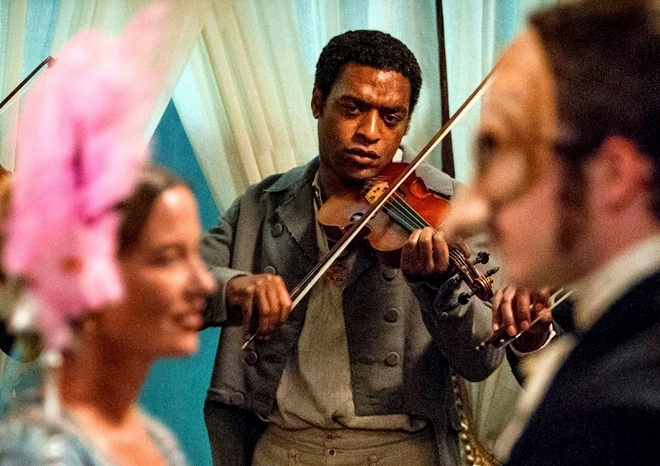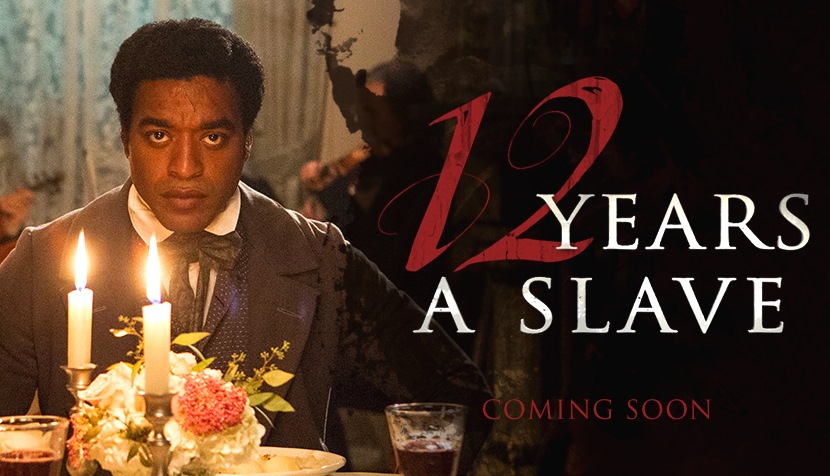
Brutal, often mesmerizing, sometimes emotional but in a strange temporary way. 12 Years a Slave has the budget and the artistry to make it the most important film of American slavery yet of pre-Civil War. It’s startling and wrenching to see an affluent African-American by the name Solomon Northup (Chiwetel Ejiofor, easily one of the three best actors of the year) get drugged, harbored and sold out of Saratoga Springs, New York and transported to the inescapable Louisiana South. After various episodes of inhumanity and white man pomposity in dealing with the slave trade, you’re either teary or just completely soul-shattered. For long stretches with Solomon now the property of a plantation slave owner the film holds you, but holds you cold. I think I have an idea of why Steve McQueen’s film does that.
Impersonal and detached have been words that have described the film, according to its detractors. Which is both accurate and inaccurate. Consider first how Ejiofor, as the intellectual violin player, is emoting great pains of injustice when we first see him chained. He attempts to articulate to his captors that he is an educated black man, a free man. There is a boil of outrage within him, and we see him with such an intense face that we can practically see words swirling in his mind about how he is going to communicate himself as unfairly enslaved. These scenes are deeply emotional, at least for the time being. Then resignation of his fate settles in, and he goes through the motions.
Pondering over the film, I don’t think one could have survived that long had one not become detached from his daily condition which is why detachment is actually a directorial style. In a scene where Solomon is hanged, with toes barely touching the ground surface to keep himself up, other blacks mind their own business sauntering by in the background. They had to, for getting involved would have only been met with punishment. Solomon will survive many more years in slavery’s clutches, tolerating each day by way of detachment, because it’s necessary for longevity. And Solomon is found only emotionally reacting to one other person: Patsey (Lupita Nyong’o), the slave mistress who is only a teen, and often debased by her white master.
The cruelest white master is Edwin Epps (Michael Fassbender, in another stupendous performance that is not quite among his career best), and even more shocking, his jealous wife (Sarah Paulson) is equally cruel in her own way. The Epps are bible-toting Christians, who have warped God’s promises to fit their own needs, a verifiable “nigger breaker” who beat, whipped, slashed his property into submission. I hope I’ve implied by now “12 Years a Slave” is far more realistic and historically authentic than “Django Unchained,” albeit, that Tarantino film had one extraordinary character: Samuel L. Jackson as Stephen, the house slave who attained influential power over other slaves. Solomon is easily the most intellectual and capable one, but was no better than any other slave, all akin to mule or dog in perspective to the white master.
Ejiofor and Nyong’o are the two black actors who register most, although Alfre Woodard has one surprising strong scene of mistress nobility. Various white actors play cruel not only very well, but even bring thought-provoking insight into their evil ways: Paul Giamatti as something of a slave broker who sees livestock, not human beings. Paul Dano as a bitter, looked down-upon overseer. Benedict Cumberbatch as the more open-minded slave owner who acknowledges Solomon is an exceptional human being, who has of course shades of both conflicted bravery and cowardice.
 But just when you think Brad Pitt has arrived for simple added star power, he brings unexpected grace and empathetic capacity to the role of a Canadian carpenter passing through Louisiana on a contract job. The fact that his character is Canadian, I think, is a big detail. He represents a more forward-thinking democracy, and sense of true integrity. His ideas of slavery abolitionism is not popular with Master Epps, in particular, and yet it hurts even to think Epps discusses the subject with him with turn a deaf ear indifference.
But just when you think Brad Pitt has arrived for simple added star power, he brings unexpected grace and empathetic capacity to the role of a Canadian carpenter passing through Louisiana on a contract job. The fact that his character is Canadian, I think, is a big detail. He represents a more forward-thinking democracy, and sense of true integrity. His ideas of slavery abolitionism is not popular with Master Epps, in particular, and yet it hurts even to think Epps discusses the subject with him with turn a deaf ear indifference.
We know 12 years will end for Solomon, because it’s in the title and that Solomon wrote the autobiographical book on his experiences. McQueen gives us two powerful scenes at the end, but I also got the feeling he didn’t want those scenes to feel too cathartic – too much outpour of feeling is curbed. No doubt the film will be viewed for years from now for cultural study and for artistic admiration. But as you come out of it, you still feel it has hit you more intellectually than emotionally.
Still, the great humanity of the film is how inhumane the depiction of slavery is, and McQueen has done that unflinchingly. McQueen’s previous films are “Hunger” (2008) and “Shame” (2011).
132 Minutes. Rated R.
HISTORICAL DRAMA /BIOPIC /WEEKEND FOOD FOR THOUGHT
Film Cousins: “Birth of a Nation” (1915); “Amistad” (1997); “Beloved” (1998); “Django Unchained” (2012).





